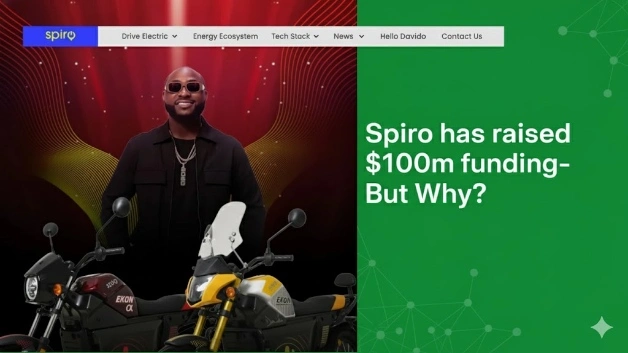Spiro, the Dubai-headquartered electric mobility company operating across six African nations, has secured $100 million in Africa’s largest-ever investment in two-wheel electric transport. Led by The Fund for Export Development in Africa (FEDA) contributing $75 million, with strategic investors providing the remaining $25 million, this funding round raises a crucial question: why is venture capital flowing into African electric motorcycles when the continent represents just 0.5% of global EV two-wheeler sales and infrastructure remains chronically underdeveloped?
The $2.6 Billion Market Nobody Expected
The answer lies in understanding what’s happening beneath the surface of Africa’s transportation transformation. Despite Africa’s electric two-wheeler market valued at just $554.68 million in 2023, projections indicate explosive growth to $2.6 billion by 2031—representing 24.78% compound annual growth that dwarfs developed markets. More remarkably, motorcycle taxis—known as boda bodas in Kenya or okadas in Nigeria—move millions through congested cities daily, with riders spending 10-12 hours covering 150-200 kilometers while fuel costs consume earnings.
Spiro operates over 60,000 electric motorcycles and 1,200 battery-swapping stations across six countries including Kenya, Rwanda, Uganda, Nigeria, Benin, and Togo, with pilots launching in Tanzania and Cameroon. The company has facilitated over 26 million battery swaps and 800 million kilometers of low-carbon travel. CEO Kaushik Burman—who joined two years ago from Taiwanese battery-swapping giant Gogoro when Spiro had just 8,000 bikes and 150 swap stations—targets deploying over 100,000 vehicles by end of 2025, representing a 400% year-over-year increase.
Why Traditional Motorcycle Manufacturers Couldn’t Compete
Spiro’s massive expansion trajectory provides context for why battery-swapping models outperform charging-dependent alternatives in African markets. When Burman joined in 2023, Kenya’s electric motorcycle market share stood at 7% penetration. Industry projections indicate reaching 10%+ in 2025, with McKinsey and Shell forecasting 800,000 EV two-wheeler sales across Ethiopia, Kenya, Nigeria, Rwanda, and Uganda by 2025.
The company’s economic proposition proves compelling: Spiro’s electric bikes cost approximately $800 versus $1,300-$1,500 for gasoline equivalents—40% lower upfront—while operating costs run 30% cheaper per kilometer since battery swapping undercuts fuel prices. According to Burman, drivers save enough that “at the end of each day, most barely save anything” with gasoline bikes transforms into doubled daily take-home pay with electric alternatives. This economic arbitrage explains rapid adoption despite Africa’s broader EV infrastructure challenges.
The Local Manufacturing Behind Africa’s Largest Round
The funding round positions FEDA as strategic partner, with Afreximbank President Professor Benedict Oramah stating: “Our investment reflects Afreximbank’s strong commitment to building a competitive and sustainable mobility sector in Africa.” Previous investors including Equitane Group (Spiro’s parent company) and Société Générale contributed over $180 million before this round, bringing total capital raised to $280 million.
The timing coincides with manufacturing localization accelerating across the continent. Spiro assembles motorcycles from completely knocked-down kits in Kenya, Rwanda, Uganda, and Nigeria, with four operational assembly plants producing batteries, traction motors, and controllers. The company’s Kenya facility uniquely employs approximately 40 women running the motor assembly line. Spiro aims increasing local sourcing from 30% today to 70% within two years, encompassing plastics, helmets, and brake components—creating jobs while reducing import dependencies.
The Battery-Swapping Network That Changed Everything
Beyond the funding, Spiro differentiates through infrastructure density competitors cannot replicate quickly. Unlike charging-dependent models requiring hours of downtime, riders swap depleted batteries for charged ones in under two minutes at strategically located stations—eliminating the operational friction that slows EV adoption where grid reliability remains inconsistent.
This infrastructure advantage compounds as network effects emerge. With plans expanding from current 1,200 stations to 3,500 by end of 2025, Spiro creates switching costs for riders who depend on ubiquitous swap locations. Competitors including Ampersand, Roam, and BasiGo operate similar models but lack Spiro’s geographic coverage spanning West, East, and Central Africa simultaneously.
Why This Matters For Global Electric Mobility
Spiro’s $100 million raise positions the company within broader 2025 African mobility dynamics where two-wheelers demonstrate fastest EV adoption:
Economic Transformation: Motorcycle taxis represent essential transportation infrastructure across African cities where public transit remains inadequate. Converting millions of riders to electric reduces imported fuel dependencies while improving air quality in densely populated urban centers experiencing rapid population growth and urbanization pressures.
Market Leadership Emerging: Africa’s electric two-wheeler market growing at 24.78% CAGR through 2031 creates category-defining opportunities. Kenya achieved 7% electric motorcycle market share in 2024, accelerating toward double-digit penetration as government policies support electrification and fuel price volatility drives adoption economics.
Battery-Swapping Validation: While Europe and North America debate charging versus swapping infrastructure, African markets demonstrate swapping superiority for commercial use cases where downtime directly impacts earnings. Spiro’s 26 million swaps validate operational viability at scale—positioning the company among global battery-swapping leaders alongside Gogoro in Asia.
The Answer: Africa’s Infrastructure Play for Mass Mobility
So why $100 million for Spiro? Because the company combines elements institutional investors value: proven operational execution managing 60,000 vehicles across six countries, proprietary battery-swapping network creating defensible moats, and strategic timing where African electric two-wheeler sales project 40% year-over-year growth despite representing just 0.5% of global market share—indicating massive upside as penetration increases.
The investment validates that Africa’s transportation challenges require purpose-built solutions rather than adapting developed-market models. With $280 million total capital, local manufacturing capacity, and expansion into Tanzania and Cameroon, Spiro positions itself as Africa’s electric mobility infrastructure provider—analogous to how China’s Yadea and India’s Ola Electric dominate their regional markets.
As Burman noted, “Our competition is the gasoline bike segment” not other EV startups. With Africa’s two-wheeler market valued at $9.15 billion in 2025 growing to $11.11 billion by 2029, and electric variants capturing accelerating share, Spiro’s funding validates that battery-swapping infrastructure captures disproportionate value in Africa’s mobility transformation. The question isn’t whether African riders need affordable, reliable transport—it’s which platform becomes the continent’s dominant electric mobility standard as deployments scale toward 800,000 annual units.
I’m Araib Khan, an author at Startups Union, where I share insights on entrepreneurship, innovation, and business growth. This role helps me enhance my credibility, connect with professionals, and contribute to impactful ideas within the global startup ecosystem.
